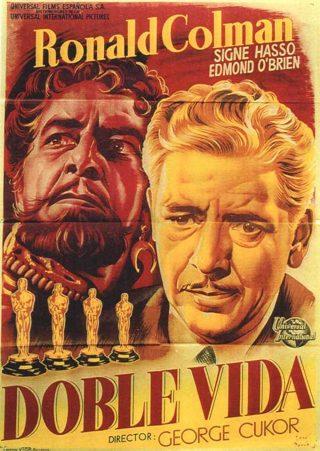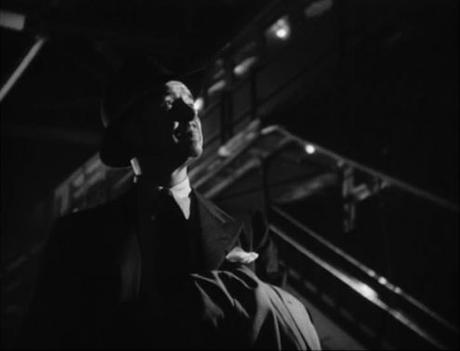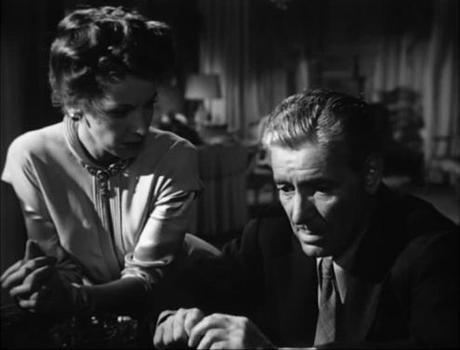
Hollywood's penchant for picking away at the veneer of its own glamorous facade to steal a furtive glance at the preening, grasping and backstabbing that lies beneath has been noted before. It tends to be fascinating, to this viewer at least, to watch people indulge in this type of cathartic soul-baring. A Double Life (1947) offers a variation on this theme, inviting us not only backstage on Broadway to peer behind the greasepaint of the performers, but drawing us deep into the soul and psyche of that master of duality, the actor. And in this case, it's a journey into darkness indeed.
How does one go about describing a man, catching the essence of the person concisely? There are people who seem to be the epitome of simplicity itself, engendering responses from those around them to the effect that he's a great guy, or perhaps not such a great guy. Sometimes there is a general consensus on this point. Then again, many a man is a much more complex proposition, a walking cocktail of positive and negative characteristics where the question of whether or not he's a right guy is wholly dependent on the opinions and experiences of the person one happens to ask. Anthony John (Ronald Colman) is an actor and is also an example of the complexity I referred to. The sense of the dual nature of man is apparent right from the beginning in both visual and narrative terms. He is first presented in the lobby of the theater where his latest successful play is running and he is caught in a brief pose in front of a portrait of himself, looking over his own shoulder in a sense, and this is then reinforced as he strolls through the city on his way to see his agent, provoking varying reactions from the individuals he encounters, some of whom sing his praises while others are somewhat less flattering.

He is about to be offered the role of Othello, one he has shied away from in the past but the allure is to prove too powerful to resist on this occasion. His ex-wife Brita (Signe Hasso) is to play the part of Desdemona, and all of this prompts hesitation and trepidation. This legally estranged couple remain close, Anthony is still in love and Brita, though more cautious and reluctant to expose herself to hurt, clearly retains feelings too. Obviously, there is the potential for two people working together under such circumstances to get swept along, or even carried away, by their passions. Initially, Anthony busies himself with rehearsals and a casual fling with a smitten waitress (Shelley Winters) but as the success of the production grows and the run is extended he finds himself drawn more and more to Brita. All well and good, but the fact is this man is known to be an actor who throws himself body and soul into his characters and that's not good news when he starts to suspect Brita of being in love with press agent Bill Friend (Edmond O'Brien). Slowly, he finds himself identifying more and more with the murderous jealousy of the man he has been portraying night after night on stage.
Frankly, I don't readily associate George Cukor with films noir, although he did make a few movies which to a greater or lesser extent drifted in that direction, such as A Woman's Face, Keeper of the Flame and Gaslight. However, A Double Life heads determinedly down those half-lit byways of the human psyche, aided enormously by the rich, shadow-laden cinematography of Milton Krasner. While there is no shortage of talent among the principal players the quality of those behind the camera is every bit as impressive and the presence of such depth and experience adds immeasurably to the finished picture. Besides Cukor and Krasner, the writing of Ruth Gordon and Garson Kanin, the lush scoring of Miklós Rózsa, and the editing of future director Robert Parrish all contribute to what is an undoubtedly classy production.

Ronald Colman won the Best Actor Oscar, as well as a Golden Globe, for his work in A Double Life, which I feel was well deserved. It's a complex and challenging role, and it's to Colman's great credit that he embraces its inherent melodrama and plays it with resolute conviction and the type of sensitivity that is vital in retaining the sympathy of the viewer. After all, he is breathing life into a character who in less capable hands could so easily alienate the audience. I'm reminded of something I once read by the critic Ian Cameron in relation to the viewer's identification or sympathy with noir protagonists. As I recall, he spoke about both the comfort and discomfort this can provoke in the audience. We get drawn in by those characters for whom we can feel some affinity, those whose positive qualities are clear to see and are more than simply cardboard heroes or villains. Still, when they are at best ambiguous or at worst outright criminals then there is an undeniable sense of discomfort on our part too; we don't really want to find ourselves sympathizing or identifying with such types, and when we have been manipulated into that position the duality that characterizes the better, or more nuanced, films noir becomes apparent. As viewers, our comfort and discomfort (and perhaps the ethical no man's land in between) is a reflection of the movies' blending of light and dark, of its frequent sallies into the murky grey areas of moral ambivalence.
A Double Life has a tight core cast with Colman obviously remaining the focal point of it all. Signe Hasso gets across the conflicted feelings of her character effectively and brings the audience along with her. Her continued love for he ex is apparent as are the reservations she has about allowing those now dormant emotions to be awakened. The delicate balance of such contrasting desires can be tricky to convey successfully but Hasso remains convincing throughout, this emotional tightrope walk as well as her portrayal of Desdemona in the drama within the onscreen drama acting as another example of the ever present theme of duality.
Shelley Winters turns in another solid performance as the earthy and ultimately tragic waitress. It's not a big part in terms of screen time but it is pivotal and Winters handles it well. I know that in the past I wasn't so taken with her work but with some recent viewings I find I'm increasingly impressed. Edmond O'Brien makes yet another appearance in yet another noir. He is good enough here, but it has to be said the part doesn't offer him as much as some others he was doing around this time. Still, what he does is fine and his presence is always welcome.
A Double Life has been given a Blu-ray release in the US by Olive, but I've been making do with my old DVD so far. This is a beautifully shot movie that oozes the noir visual aesthetic while the tragic conflict at the heart of the story anchors it firmly in the choppy waters of dark melodrama. This is a very polished production and one which I find repays repeated viewings.
